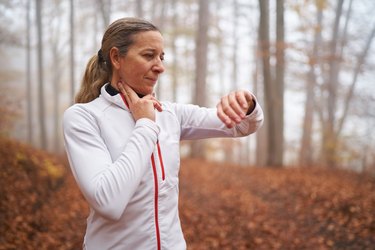
Chances are you're well acquainted with the basic ebbs and flows of your heartbeat: It picks up when you're anxious and slows down when you're relaxed. But many other factors can affect heart rate — like biology, your daily cup of coffee, your bill of health and more.
Read more: What's Causing Your Elevated Heart Rate?
Video of the Day
Video of the Day
Biological Factors Affecting Heart Rate
There are several different kinds of heart rates, starting with your resting heart rate. That's the number of times your heart beats in one minute when your body is in a state of rest and calm, explains the American Heart Association (AHA). The average resting heart rate is 60 to 100 beats a minute, but which side of that spectrum your own heart rate leans toward says a lot about your health.
"Multiple factors can affect a person's resting heart rate, including age, sex, level of physical conditioning and any medical and cardiac diseases they may have," says Vasundhara Muthu, MD, a cardiologist with the University of Maryland Medical System in the Baltimore area.
Fitness can affect your heart rate in a variety of ways: The more fit you are, the lower your resting heart rate tends to be, the AHA explains.
Two other types of heart rates — maximum heart rate and target heart rate — come into play when you get your heart pumping during a workout. Maximum heart rate (calculated by subtracting your age from 220) is your heart's limit during exercise, Mayo Clinic says. And your target heart rate — 50 to 70 percent of your max heart rate for moderate-intensity exercise, and 70 to 85 percent for vigorous activity — strikes the balance between having a fit heart versus an overworked heart.
So, how do you know where within these ranges your heart rate will land during a workout? "The rise in heart rate with physical activity will depend predominantly on the level of physical conditioning and your heart and lung health," explains Dr. Muthu.
Any underlying health conditions you may have, such as chronic heart and lung diseases, can play a role in heart rate elevations and irregularities, Dr. Muthu adds. These can also include anemia, thyroid disorders, fever, infections, pain as well as anxiety and other psychiatric conditions, she explains.
What Else Affects Heart Rate
Did you know that your daily cup of coffee can also ramp up your heart rate? Coffee and energy drinks containing caffeine, supplements and other stimulants play a role in a quickened pulse rate, according to the U.S. National Library of Medicine. Caffeine reaches its peak level in the bloodstream within one hour of consuming it, and its effect can last up to four to six hours.
Your favorite alcoholic beverages could impact your heart rate, too, especially if you tend to drink to excess. A research review published in 2017 in Alcohol Research Current Reviews found that binge drinking is associated with an irregular and very fast heart rate. Binge drinking means having more than five alcoholic beverages for men and four for women within two hours, according to the Centers for Disease Control and Prevention.
One of the most serious effects of binge drinking is a type of irregular heart rate (arrhythmia) called atrial fibrillation, which can increase your risk for other serious health issues like stroke, the review explains.
Even the weather can affect your heart rate, according to the Cleveland Clinic, especially during exercise. During the dog days of summer, your cardiovascular system helps keep your body cool by radiating heat out of the body — but if you exercise in hot weather, your heart may work overtime to cool you down. In fact, your heart beats about 10 beats a minute faster for every degree that your internal temperature increases, the Cleveland Clinic states.
Read more: Does Exercising in Hot Temperatures Burn More Fat?
What to Do
With all of the different factors that can cause a variation in heart rate, when should you actually be concerned?
"An individual should see a doctor if their heart rate is persistently elevated (more than 100 beats a minute) or if there is a change in baseline resting heart rate with any new symptoms, such as palpitations, shortness of breath, chest pain, fatigue, leg swelling, weight gain or loss, dizziness or fever," Dr. Muthu says.
- American Heart Association: “Target Heart Rates Chart”
- Alcohol Research Current Reviews: “Alcohol’s Effects on the Cardiovascular System”
- Centers for Disease Control and Prevention: “Binge Drinking”
- Cleveland Clinic: “How Hot Weather Can Affect Your Heart When You Exercise”
- Mayo Clinic: “Exercise Intensity: How to Measure It”
- U.S. National Library of Medicine: “Caffeine”
- Vasundhara Muthu, MD, cardiologist, University of Maryland Medical System, Baltimore